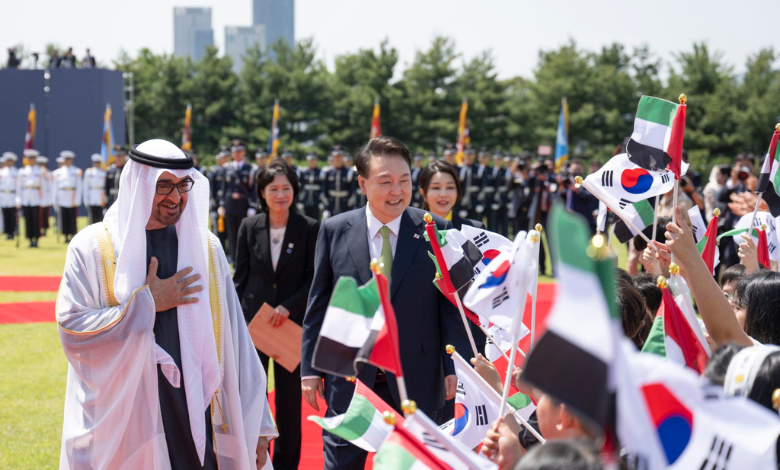UAE president to begin state visit to China on May 30: Explore UAE-China diplomatic and economic ties
UAE President HH Sheikh Mohamed bin Zayed concluded his state visit to South Korea on May 29. His high-profile trip to Seoul involved discussions with his South Korean counterpart Yoon Suk Yeol, business leaders, and Emirati students in South Korea, among others.
He is scheduled to begin a state visit to China on May 30. It comes after an invitation from his Chinese counterpart Xi Jinping. During the visit, both leaders are expected to discuss bilateral relations and opportunities for further cooperation and collaboration.
The economic, developmental and cultural fields are likely to be granted more attention. His Highness is also set to attend celebrations marking the 40th anniversary of the establishment of UAE-China diplomatic relations, according to media reports.
UAE remains China’s top trade partner in Arab region
The UAE and China first established their diplomatic ties in 1984. The UAE has a consulate general in Hong Kong and an embassy in Beijing. China has an embassy in Abu Dhabi and a consolate general in Dubai.
The countries have long been close partners, collaborating extensively on various fields. They share a robust partnership integral to both countries’ development and foreign policy objectives, noted China Briefing in a report dated May 10, 2024.
Bilateral trade thrives as the Emirates remains China’s top trade partner in the Arab region. Bilateral commerce reached improved heights in 2021, exceeding $75.6 billion. As of 2022, about 6,000 Chinese businesses operate in the Gulf state.
UAE-China noting impressive non-oil trade numbers
Recent years have seen a substantial increase in bilateral economic and trade cooperation. China consistently serves as one of the UAE’s leading trade partners. By last year, bilateral trade had already reached a staggering $95 billion, approximately.
In 2022 alone, bilateral non-oil trade noted an impressive annual growth rate of 18%, culminating in a non-oil trade exchange surpassing $72 billion. Such exponential surges highlights the depth of economic engagement between both countries.
In 2018, Chinese President Xi Jinping made a state visit to the UAE, becoming the first Chinese head of state to visit the Gulf state in the previous 29 years. The visit helped lift bilateral relations to a “comprehensive strategic partnership”.
UAE’s involvement in China’s Belt and Road Initiative
The UAE and China share deepening ties characterised by frequent high-level exchanges and improved political mutual trust, fostering bilateral cooperation across diverse sectors such as technology, logistics, organic chemicals, mineral fuels, oils and distillation products.
In the past 10 years, the UAE and China have been extensively involved in joint ventures (JVs) in the free trade zones through ports, the construction of unique export-oriented economic zones, and the establishment of industrial projects.
One of the key projects binding the UAE and China together stronger is Beijing’s Belt and Road Initiative. The Gulf region is, undoubtedly, playing a significant part in the BRI due to its geographic location at the crossroads of Asia and Europe.
UAE has a head start on its neighbours
The UAE is also playing a notable role in the ambitious BRI project. The country is optimally positioned to lead the BRI nations in the Gulf and solidify its position as the region’s commercial hub and entryway to Africa, reported China Briefing.
The UAE has a head start on its neighbours. More than any other Gulf state, the Emirates has benefited from import, export and re-export opportunities. The country has made significant investments in infrastructure, leading to extremely busy airports and seaports.
Dubai’s DXB Airport has long been one of the busiest airports across the globe. Other important airports in the country include the Abu Dhabi Airport, serving as to home base for Etihad Airways, and the Dubai Al Maktoum Airport, mostly used for cargo flights into Dubai.

Comments
Post a Comment